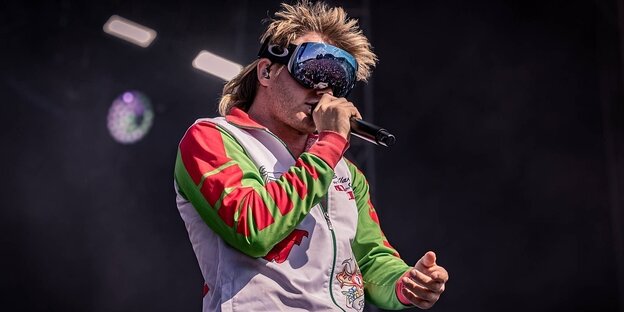Universal Music has removed millions of songs from TikTok and is demanding more money for artists. Many of them trust the platform.

Someone who probably wouldn't have become a star without TikTok: Berlin rapper Ski Aggu Photo: Markus Koeller/imago
“Since my TikTok sounds are offline, I can finally feel real life in nature again,” says Berlin rapper Ski Aggu with his usual humor in a recent TikTok post. Without the short video app operated from China, I probably wouldn't be a star today. He scored his first number one hit last summer thanks to a reinterpretation of Otto Waalkes' song “Friesenjung” and a clever TikTok campaign in which he appeared with the comedian.
As of Thursday, videos promoting the song, each viewed hundreds of thousands of times, have remained silent. “Sound has been removed due to copyright restrictions,” is written on the side of the screen. The Ski Aggu channel now looks ghostly. You can watch videos for minutes, watch him dance and rap in front of the camera, see crowds cheering at concerts, but you hear nothing.
The songs of Taylor Swift, currently the most successful pop star in the world, are also affected. That of the rapper Drake, who often relied on viral marketing, or that of the singer Olivia Rodrigo, an expert on TikTok. You can still hear music in some of her videos. But if you click the record symbol, which usually allows you to reuse an excerpt from a song, you'll get an error message.
The situation remains inconsistent. One thing is clear: artists from Universal Music Group and its subsidiaries are affected.
Problem with AI generated music
Along with Warner and Sony, Universal is the world's largest record label and has a share of almost a third of the global music market. Now it has not renewed its licensing agreement with TikTok. The company cites several reasons for this, including low royalties. Comparable platforms would pay many times more for the use of copyrighted music, according to a statement from Universal. TikTok also actively encourages the use of AI-generated music. That could drive out real musicians. TikTok's business model is built on their backs.
Universal is undoubtedly right on this point. After starting out as an app for dance and lip-sync videos, TikTok is now a social network that hosts all types of content. But music is an integral part. Even the BookTok scene, which actually deals with literature, accompanies the videos with songs, preferably, of course, those that are trending on the application. So Universal has used a powerful negotiating lever: withdrawing the catalogs of some of the world's biggest pop and Internet stars.
On the other hand, the music industry depends on TikTok. The platform sets the pace. An example: “It wasn't a phase, mom! “It's a lifestyle,” one TikTok user shouted at the camera in late 2020, then played music by 2000s pop-punk band All Time Low on his car radio. The short video set the tone. foundations for pop-punk to exist again and be an integral part of the charts.
TikTok users take it with humor
Conflicts between the technology and music industries, particularly around licensing and compensation issues, have existed at least since the beginning of online music distribution. Warner muted their catalog on YouTube in 2008. It wasn't until nine months later that a new deal was reached. Meanwhile, artists protested that they were losing attention.
This time it could be similar: Ski Aggu isn't the only one who probably couldn't fill concert halls without TikTok. Universal's statement speaks of a “time out.” The longer it takes, the more pressure artists will put on because they are missing an important marketing channel. It's not entirely clear whether the higher royalties the label wants to negotiate can offset this.
Meanwhile, TikTok users react to the events with humor. In one video, dance group Bronx Sistas simply raps the song Ski Aggu, which is part of their choreography. Others add cricket chirping to videos and declare the unreal atmosphere of muted TikToks a trend.